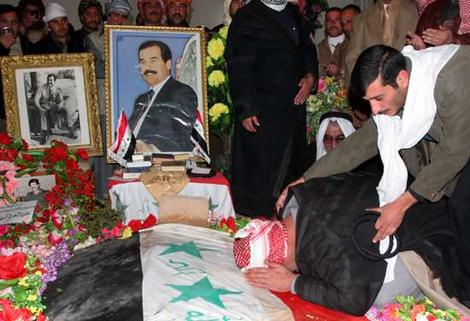حناني ميــــــا الإدارة العامة

معلومات إضافية
الأوسمة :   المشاركات : المشاركات : 23991  نقاط : نقاط : 218444  التقييم : التقييم : 15 العمر : 82
 |  موضوع: Saddam Hussein, nostalgia for a leader موضوع: Saddam Hussein, nostalgia for a leader  الإثنين 17 ديسمبر 2012 - 23:46 الإثنين 17 ديسمبر 2012 - 23:46 | |
| Saddam Hussein, nostalgia for a leader  In what passes for a mausoleum here, the body of Saddam Hussein lies in the middle of a marble octagon, under a giant twinkling chandelier and purple, orange and blue blinking lights. His grave is covered with Iraqi flags, candies thrown by children and bundles of plastic flowers.It has been four years since the former Iraqi leader was executed, and over that period it has been rare to see any more than a trickle of Iraqis show up to pay tribute in the village where he was born, just outside Tikrit.But over the past few months, the crowds have begun to grow.On some recent weekends, more than 100 people at a time have crowded the mausoleum, somehow compelled to travel to the shrine of the man who once terrorized large parts of the country’s population. Some visitors say they are acting out of nostalgia, not just for a safer Iraq but for a more stable Middle East, like the one that predated the upheaval of the current Arab Spring."He was the lion of the Middle East; he was stronger than all of the other Arab leaders. Look at them, they are falling now like flies," said Abu Hanza al-Khazraji, a Shiite who this week spent a morning driving to Hussein’s grave with a carload of elders from the village of Dujail."Maybe the only one like him was [Libyan leader Moammar] Gaddafi, and now Americans are targeting him," said the man’s brother, Abu Ali al-Khazraji.In what was once a community center, the visitors shuffle past dozens of photos of Hussein, many of him posing with rifles or side by side with his sons, who were killed by U.S. strikes and whose bodies are buried nearby.Accurate counts of visitors are not kept. More than 1,100 people have signed a guest book in the past five weeks. But during an afternoon this week, only about 1 in 20 visitors signed the book. Instead, most went straight to Hussein’s grave or read from a poem dedicated to "the courageous hero, the martyr.’’"Even when you are in the grave you frighten,’’ reads the poem, inscribed on a wall above the grave. "They killed you and revived in our conscious your memory."Most visitors said they recalled days under Hussein when their children could go to school without fear of improvised explosives on roadways and when the electricity stayed on far longer than it does these days."Everything was better," one Sunni said."He was a dictator, but he was one dictator; now we have many," said another.The spectacle is clearly the kind of thing the U.S. government sought to avoid when it chose to bury Osama bin Laden at sea, rather than in a grave that might attract the faithful.Joost Hiltermann, who has studied the Iraq conflict for the International Crisis Group, said the increase in visitors to Hussein’s grave represents only a swath of Iraq’s population."There are many Shias and Kurds who say, 'The dictator is gone and we live more freely now.’ But Iraq is still an unhappy place," Hiltermann said. "A significant part of the population is nostalgic for strong leadership, unhappy about the endemic instability, and fears growing influence by Iran and senses that Iraq as a regional power is weakened."The carload of Shiites from Dujail had driven to Tikrit from a village where Hussein ordered the massacre of 148 of the Khazrajis’ fellow Shiites after an assassination attempt in 1982. It was for those killings that Hussein was tried and executed in 2006, before his more well-known atrocities, such as deploying chemical weapons against Kurds, were taken up by Iraqi courts.Nevertheless, Abu Hanza al-Khazraji, one of the group from Dujail, left no doubt that what he mourned was the loss of a strong Iraqi leader."Our nation is gone," Khazraji said. "He represented Iraq, and when we lost him, we lost our pride. We were once a proud people."By Aaron C. Davis, The Washington Post In what passes for a mausoleum here, the body of Saddam Hussein lies in the middle of a marble octagon, under a giant twinkling chandelier and purple, orange and blue blinking lights. His grave is covered with Iraqi flags, candies thrown by children and bundles of plastic flowers.It has been four years since the former Iraqi leader was executed, and over that period it has been rare to see any more than a trickle of Iraqis show up to pay tribute in the village where he was born, just outside Tikrit.But over the past few months, the crowds have begun to grow.On some recent weekends, more than 100 people at a time have crowded the mausoleum, somehow compelled to travel to the shrine of the man who once terrorized large parts of the country’s population. Some visitors say they are acting out of nostalgia, not just for a safer Iraq but for a more stable Middle East, like the one that predated the upheaval of the current Arab Spring."He was the lion of the Middle East; he was stronger than all of the other Arab leaders. Look at them, they are falling now like flies," said Abu Hanza al-Khazraji, a Shiite who this week spent a morning driving to Hussein’s grave with a carload of elders from the village of Dujail."Maybe the only one like him was [Libyan leader Moammar] Gaddafi, and now Americans are targeting him," said the man’s brother, Abu Ali al-Khazraji.In what was once a community center, the visitors shuffle past dozens of photos of Hussein, many of him posing with rifles or side by side with his sons, who were killed by U.S. strikes and whose bodies are buried nearby.Accurate counts of visitors are not kept. More than 1,100 people have signed a guest book in the past five weeks. But during an afternoon this week, only about 1 in 20 visitors signed the book. Instead, most went straight to Hussein’s grave or read from a poem dedicated to "the courageous hero, the martyr.’’"Even when you are in the grave you frighten,’’ reads the poem, inscribed on a wall above the grave. "They killed you and revived in our conscious your memory."Most visitors said they recalled days under Hussein when their children could go to school without fear of improvised explosives on roadways and when the electricity stayed on far longer than it does these days."Everything was better," one Sunni said."He was a dictator, but he was one dictator; now we have many," said another.The spectacle is clearly the kind of thing the U.S. government sought to avoid when it chose to bury Osama bin Laden at sea, rather than in a grave that might attract the faithful.Joost Hiltermann, who has studied the Iraq conflict for the International Crisis Group, said the increase in visitors to Hussein’s grave represents only a swath of Iraq’s population."There are many Shias and Kurds who say, 'The dictator is gone and we live more freely now.’ But Iraq is still an unhappy place," Hiltermann said. "A significant part of the population is nostalgic for strong leadership, unhappy about the endemic instability, and fears growing influence by Iran and senses that Iraq as a regional power is weakened."The carload of Shiites from Dujail had driven to Tikrit from a village where Hussein ordered the massacre of 148 of the Khazrajis’ fellow Shiites after an assassination attempt in 1982. It was for those killings that Hussein was tried and executed in 2006, before his more well-known atrocities, such as deploying chemical weapons against Kurds, were taken up by Iraqi courts.Nevertheless, Abu Hanza al-Khazraji, one of the group from Dujail, left no doubt that what he mourned was the loss of a strong Iraqi leader."Our nation is gone," Khazraji said. "He represented Iraq, and when we lost him, we lost our pride. We were once a proud people."By Aaron C. Davis, The Washington PostEmail This BlogThis! Share to Twitter Share to Facebook Share to Google Buzz   Links to this post Links to this post Labels: Iraq, Saddam Hussein Iraqis flee violence in Syria It's easy to identify the Iraqis fleeing the violent uprising in Syria as they arrive by bus in Baghdad. They're the ones carrying a sad array of worldly possessions: blankets and mattresses tied with cord; TVs and curtain rods; boxes once filled with food from the UN's refugee agency now packed with clothes and baby toys.It is better to die in our own country than to die abroad," said Zeena Ibrahim, a 33-year-old pregnant mother of two. She returned with her husband from Damascus, where they have lived since 2006. Her husband used to be in the Iraqi army, and after receiving repeated threats and attending funerals almost daily for fellow soldiers, the couple decided to flee to the safety of Syria. Now that haven is gone. And as uprisings and revolutions sweep the Middle East, many Iraqis are beginning to return home.It is a development that says just as much about the improving security in Iraq as it does about the deteriorating conditions in countries that used to be stable. More than 850 people have been killed in Syria as the regime of President Bashar Assad has cracked down on a popular uprising that began in March. Although Iraq still has its share of bombings and shootings, it is nothing compared with 2006 or 2007, when bombings were a daily occurrence and death squads tortured people with electric drills.No doubt Iraq's situation now is better than the situation in several countries in the region and this has encouraged some Iraqis to return to their country and enjoy some peace," said Salam al-Khafaji, Iraq's deputy migration minister. How many will come home remains to be seen and is likely dependent on just how bad things get in the region , especially in neighboring Syria, where many Iraqis had fled.The movement is raising concern among Iraqis about how the newcomers will affect the country's economy and still shaky relations between Sunnis and Shiites. Iraq has seen waves of outward migration beginning with the Iran-Iraq war in 1980 and continuing through the sanctions of the 1990s. There was a brief period after the US invasion when Iraqis came home, but that quickly changed when the bombings and killings began.The International Organization for Migration estimates that about 2 million Iraqis are in neighboring states. Some are in Jordan, but most live in Syria, which until 2008 allowed Iraqis to enter without visas. Al-Khafaji said the ministry does not have numbers on people returning from Syria. But anecdotal evidence at the vacant lot where the buses arrive from Syria suggests the beginning of what could be an exodus if the situation there deteriorates further. Buses pull in after the roughly 10-hour overnight journey from Damascus to Baghdad. Before the uprising began, about 12-15 buses traveled between Baghdad and Damascus each day, said bus company owner Mohammed Nosh. Now about 25-30 buses make the daily trip, he said.Mustafa Munaf of the al-Baqie travel agency said between 750 to 1,000 people have been traveling on his buses from Syria on a weekly basis since March, while only about 250 make the return journey. Many are men going to Syria to collect their wives and children who were sent there during the insurgency while they stayed in Iraq to work. Other travel agencies said traffic from Baghdad to Syria had dropped 50 percent while return traffic was up 75 percent. Many send empty buses to Damascus to pick up passengers.Some returning Iraqis report fighting in their neighborhoods in Syria, with police everywhere. Others describe how Iraqis are being targeted. "The situation is very bad , killings and robberies," said Hassan Abdul-Hussein, a father of six who used to live in Damascus. He and his family left Iraq to find work nearly a year ago. "On the walls, they wrote in graffiti, 'Iraqis leave to your country."' According to the UN's refugee agency, 3,040 people returned to Iraq in January, 3,250 in February and 4,570 in March. That's a jump from the 2,220 who returned home in December. With the exception of a jump in Christian families fleeing their homes after attacks on Christians, statistics from the IOM suggest few families are fleeing their Iraqi homes now.Some are returning from Egypt, Libya and Yemen. Iraq's Migration Ministry says 2,250 have come back from Egypt since the protests began there in January. The government evacuated 383 people from Libya and 261 were evacuated from Yemen.Al-Khafaji said Prime Minister Nouri al-Maliki evacuated people on his personal jet from various countries, but he did not have those figures. Others have made their way back from Tunisia on their own, he said. He knew of only a few students who went back to Egypt to continue their studies.Returnees are supposed to register with the ministry, but most go directly to family members who help them find a place to stay, meaning statistics are incomplete. Salim Rahim moved his family of five to Libya in the 1990s when his wife found a job at a university. But after more than a decade in Tripoli and Misrata, they fled without even their children's stuffed animals. An ambulance driver helped them escape Misrata, and they eventually made it to Tunisia where the Iraqi government got them on a planehome.We left Misrata because life stopped there. Food prices doubled and tripled. There is no government there," said Salim Rahim. Their two cars were destroyed by shelling, and a tank round blew a hole in their apartment. At one point, they were too scared to even talk by phone with family in Iraq because the Libyan government was showing TV footage of people arrested for allegedly speaking with foreign media.Iraqi officials seem to be preparing for even more returnees. Government officials had visited Libya before the uprising to encourage Iraqis there to return home, saying their country needed doctors, lawyers and professors. Iraq has given returning citizens 300,000 Iraqi dinars , about $250, and there have been vague promises to find them government jobs and let students complete their degrees. So far, those promises have failed to materialize. Associated Press | |
|
لطفي الياسيني  معلومات إضافية
الأوسمة :   المشاركات : المشاركات : 80135  نقاط : نقاط : 713946  التقييم : التقييم : 313 العمر : 118  |  موضوع: رد: Saddam Hussein, nostalgia for a leader موضوع: رد: Saddam Hussein, nostalgia for a leader  الثلاثاء 18 ديسمبر 2012 - 0:43 الثلاثاء 18 ديسمبر 2012 - 0:43 | |
| God bless my companion living martyr Saddam Hussein and bring him into His Hanath I am God and to Him we return
Lived delicate pen slave
Elegant and lived writings thin
Long for us and wonderful long gnashing your pen
Respect your student
Abu Mazen | |
|








 المشاركات
المشاركات نقاط
نقاط التقييم
التقييم











